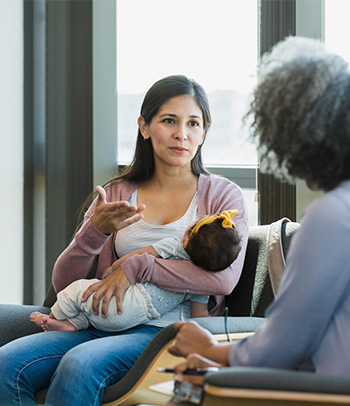You and your baby deserve your very best. If you’re experiencing any symptoms of postpartum depression, reach out and get the support you deserve.
Getting pregnant and having a baby can be one of the happiest, most joyous times in a woman’s life, but childbirth can also be difficult, overwhelming and exhausting. Throughout the process, women go through changes to their physical health, emotional well-being and way of life. These changes can bring about a condition called postpartum depression.
According to the National Library of Medicine, as many as 1 in 7 women will experience postpartum depression. But you and your baby don’t have to suffer alone. Postpartum depression is treatable, and support is available to help you thrive as a new parent. Learn more about postpartum depression, its symptoms and what resources are available to help.
What Is Postpartum Depression?
After having a baby, you may experience many different emotions ranging from excitement to exhaustion. Sometimes within the first couple of weeks after giving birth, women experience “the baby blues.” Women who suffer from the baby blues may go through crying bouts or feel sad, anxious and irritable. But the baby blues tend to go away within the first few weeks after giving birth and don’t affect your ability to function or take care of your baby.
Postpartum depression is different. Postpartum depression tends to last longer, according to the National Library of Medicine, and severely affects a woman’s ability to function normally.
What Are the Symptoms?
Postpartum depression won’t look exactly the same for everyone, but there are some common symptoms to watch out for. The National Library of Medicine shares that postpartum depression is diagnosed when at least five depressive symptoms are present for at least two weeks, or when you have a major depressive episode with the onset of pregnancy or within four weeks of delivery.
These symptoms would be present almost every day and would be a change from your normal routine:
- Depressed mood most of the day
- Loss of interest or pleasure in things you used to enjoy
- Insomnia or sleeping more than usual
- Feelings of worthlessness or guilt
- Loss of energy/fatigue
- Impaired concentration, indecisiveness
- Changes in weight or appetite (eating more or less than normal)
- Low self-esteem
- Suicidal ideation
Some varied emotions during pregnancy or after giving birth are normal, but if your symptoms are severe or last longer than two weeks, reach out to your health care provider. For example, if it becomes too difficult to get things done at home, or if you have thoughts of hurting yourself or your baby, or feel like you cannot care for yourself or your baby, it’s important to get the help and treatment you deserve.
What Are the Risk Factors?
Anyone can develop postpartum depression. Nothing you did or didn’t do can cause it, but knowing if you’re more at risk for developing it may help you look out for its symptoms.
The National Library of Medicine, as well as the Office on Women’s Health, states you may be at risk for postpartum depression if you have any of the following risk factors:
- A history of depression or anxiety
- A history of sexual abuse
- Childhood abuse or adversity
- A risky pregnancy or a difficult or traumatic birth (such as an emergency C-section or preterm birth, hospitalizations during pregnancy, etc.)
- A baby born with special needs
- A lack of social support from family, friends or your partner
- A history of domestic violence
- A history of smoking
Women Veterans are also at risk for developing postpartum depression. As a Veteran, if you have experienced trauma in your past, you may find aspects of pregnancy, labor, breastfeeding and parenting upsetting because of increased trauma reminders, according to the Department of Veterans Affairs (VA). VA can help you with your psychological health before, during and after your pregnancy.
How Is Postpartum Depression Treated?
Just like other mental health conditions, postpartum depression is treatable. However, for a number of reasons, postpartum depression often goes undiagnosed and untreated. Some women may be worried that they’ll be looked down upon if they admit to feeling depressed or unable to care for their new baby. Others may feel guilty that they’re feeling so low when others expect them to be so happy.
But you deserve to get the treatment and support you and your baby need to thrive. Postpartum depression is most often treated through a combination of medication (such as antidepressants) and therapy (counseling sessions with a mental health professional to learn coping strategies), according to the Office of Women’s Health and within the U.S. Department of Health and Human Services (HHS).
Getting treatment for your postpartum depression is an important part of your overall health and wellness, as well as the health of your baby. Research shows that when left untreated, postpartum depression can impact the bond between a mother and child, as well as the growth and development of the baby, including delays in language development, behavior problems and more.
What Steps Can I Take if I’m Worried About Postpartum Depression?
- Learn the signs and symptoms of postpartum depression. Knowing what to watch out for during pregnancy and after childbirth will help you determine if you need to reach out to a health care provider for more support.
- Take a childbirth education class. Ask your health care provider if there are any educational opportunities that may help you learn more about pregnancy, childbirth and parenting. The more you know, the more confident and ready you may feel.
- Learn where and how to seek help and support. Check out the resources below to learn more about what services and support are available to help you throughout the childbirth process.
- Pay attention to your emotions during pregnancy. Postpartum depression can start during pregnancy, so if you’re experiencing depressive symptoms, talk to your health care provider and have a plan in place after giving birth.
- Take care of yourself. It can be hard to remember when you’re caring for a new life, but getting enough sleep, taking a moment to yourself and eating nutritious foods your body needs can help you get through a challenging and exhausting time.
- Don’t try to do everything by yourself. You don’t have to do everything alone. If you’re feeling overwhelmed, it’s OK to ask for help from your partner, your family members or your close friends.
- Be open about your feelings and emotions. Don’t worry about what people might think or how it looks, be open if you’re feeling depressed or overwhelmed after giving birth. Talk to your partner, family members and friends openly and honestly about how you’re feeling.
- Find a support group. Ask your health care provider, look around your community or search online for a support group you can join. There are often new parent groups, breastfeeding support groups and more. Connect with people who understand what you’re going through.
- Continue with your regular health care appointments after childbirth. During pregnancy, there are several scheduled appointments to ensure the health of you and your baby, but it’s just as important to continue to prioritize your physical and mental health after giving birth. Your health care team can help you assess your emotional wellness, physical recovery from birth, management of chronic diseases and more.
What Resources Are Available to Help?
- VA offers several resources to help Veterans dealing with postpartum depression, including:
- Clinicians with specialized training in reproductive mental health.
- Maternity care coordinators who can answer questions, navigate health care services, connect you with community resources and much more.
- The Women Veterans Call Center to help you find available resources and services in your area, as well as answer your questions on health care, set up appointments and more.
- The National Maternal Mental Health Hotline provides free, confidential support before, during and after pregnancy 24 hours a day.
- Make the Connection offers stories of Veterans who have dealt with mental health issues, including Kim, an Air Force Veteran, who experienced postpartum depression.
- The Office on Women’s Health Talking Postpartum Depression campaign provides stories from women who experienced postpartum depression, reminding us that it’s a common and treatable mental health condition that can affect anyone.
You and your baby deserve your very best. If you’re experiencing any symptoms of postpartum depression, reach out and get the support you deserve.







